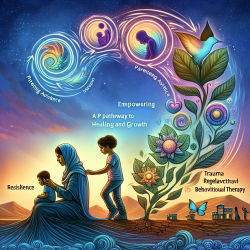Introduction
In the realm of speech-language pathology, the integration of evidence-based practices is paramount. The recent research article titled Building Resilience Against ViolencE (BRAVE): protocol of a parenting intervention for mothers and fathers with post-traumatic stress disorder in Pakistan offers valuable insights into a parenting intervention aimed at supporting parents with PTSD. This blog explores how practitioners can leverage these findings to enhance their therapeutic approaches, ultimately fostering better outcomes for children.
The Importance of Addressing Parental PTSD
Parental PTSD is a significant concern, particularly in regions like Pakistan, where exposure to trauma is prevalent due to natural disasters and conflicts. The impact of PTSD extends beyond the individual, affecting family dynamics and child development. Research has shown that children of trauma survivors are at increased risk for mental and physical health issues, behavior problems, and trauma symptoms.
Understanding the BRAVE Protocol
The BRAVE protocol is a pilot cluster randomized controlled trial that examines the feasibility and effectiveness of a combined intervention of Learning Through Play (LTP) and Trauma-Focused Cognitive Behavioral Therapy (TF-CBT) for parents with PTSD. This intervention aims to improve parents' mental health and promote healthy child development through structured group sessions facilitated by trained psychologists and community health workers.
Key Findings and Implications for Practice
The study highlights several key findings:
- Feasibility and Acceptability: The intervention was found to be feasible and acceptable among participants, indicating its potential for broader implementation.
- Positive Outcomes: Preliminary results suggest improvements in parental mental health and child development outcomes, underscoring the effectiveness of integrating LTP with TF-CBT.
- Community Involvement: The involvement of community health workers in delivering the intervention highlights the importance of community-based approaches in increasing access to mental health support.
Practical Applications for Practitioners
Practitioners can draw on these findings to enhance their therapeutic approaches:
- Integrate Play-Based Interventions: Incorporating play-based activities can engage parents and children, fostering positive interactions and supporting developmental milestones.
- Utilize Group Therapy Models: Group settings provide opportunities for shared experiences and peer support, which can be particularly beneficial for trauma survivors.
- Engage Community Resources: Collaborating with community health workers can enhance the reach and impact of interventions, particularly in low-resource settings.
Encouraging Further Research
While the BRAVE protocol provides promising insights, further research is needed to explore its long-term effects and adaptability in different cultural contexts. Practitioners are encouraged to contribute to this growing body of knowledge by conducting studies and sharing their findings.
Conclusion
The BRAVE protocol offers a compelling framework for addressing parental PTSD and supporting child development. By integrating evidence-based practices and fostering community collaboration, practitioners can make a meaningful impact on the lives of families affected by trauma.
To read the original research paper, please follow this link: Building Resilience Against ViolencE (BRAVE): protocol of a parenting intervention for mothers and fathers with post-traumatic stress disorder in Pakistan.










